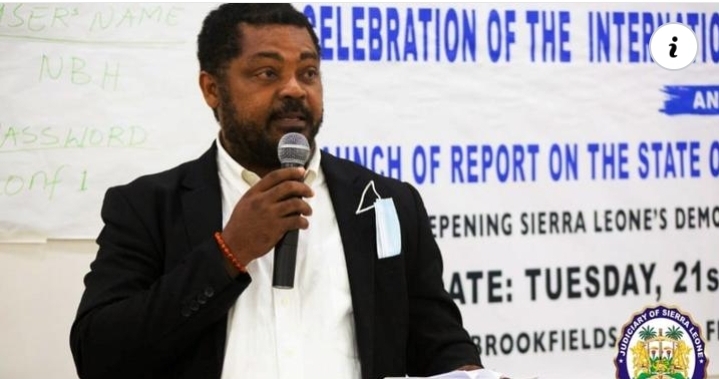President of the Sierra Leone Association of Journalists (SLAJ), Ahmed Sahid Nasralla has assured that the Association is on the road to adopting a gender policy.
Nasralla said: “For ages, women have been suffering several forms of inequality and numerous discriminatory practices. The global occurrences leading up to 2023 and the notable actions taken by international stakeholders to curb inequality have resulted in the major steps being taken by local partners, especially women’s rights organisations and the Government of Sierra Leone for our country to produce legal instruments that foster women’s empowerment”.
On Thursday, 19th January 2023, His Excellency President Dr. Julius Maada Bio signed into law The Gender Equality and Women’s Empowerment (GEWE) ACT 2022.
This Act requires public and private entities to reserve 30 percent of their jobs for women in a bid to tackle gender imbalances in a male-dominated society.
President Nasralla applauded the Government for taking into consideration the felt needs of the women in the country, by enacting this law.
“This is a great step towards ensuring gender equality in all spheres of society. While SLAJ recognises that discrimination, harassment, and inequality on the basis of gender are not limited to the media, the Association acknowledges that gender inequality is a major challenge in the media in Sierra Leone.
“The media in Sierra Leone is male-dominated, in terms of ownership and representation in leadership positions across individual media institutions as well as in SLAJ and its affiliate bodies. Out of a total of 718 active SLAJ members, only 170 are women. There are significant changes in the electronic media, but the print media still has a long way to go.”
Globally, the International Federation of Journalists (IFJ) focusing this year’s IWD celebration on “Women Reporting Conflicts”, reports that in 2022, 10 women were killed in the line of duty.
According to the IFJ; “Women journalists face extreme challenges while reporting on the ground, from military attacks and threats to police intimidation, surveillance, and systematic gender-based violence.
Their safety is regularly put at risk, and many have developed their own tactics to stay safe.”
Female journalists have fewer training opportunities, face discrimination and threats online in what they cover, and sexual harassment and intimidation in the workplace.
Nasralla concluded: “As we approach the June 2023 public elections, SLAJ is working with partners and Election Monitoring Bodies to ensure the safety and security of female journalists covering the elections as well as female politicians taking part in them.
“The Media Reform Coordinating Group (MRCG) and the Women in the Media Sierra Leone (WIMSAL) have organized capacity-building programs for female journalists. The MRCG’s draft policy on safety and security also captures issues concerning female journalists in the country.
“For us in SLAJ, we choose to address this issue of inequality, harassment, and intimidation by ensuring that we embed the GEWE Act 2022 within the Association. SLAJ commits itself through its Gender Advisory Panel which comprises members and people from civil society to institute affirmative action within the Association.
“The Association through a project supported by Irish Aid will launch a draft gender policy and do a nationwide tour to fine-tune its content for implementation this year. This policy aims to contribute to gender equality and women’s empowerment in all forms of media in Sierra Leone.”
The journalists’ president said: “SLAJ is committed to non-discriminatory practices and very proud to have women journalists as key members of our governing structure: The chairpersons for our Disciplinary Committee, the SLAJ Electoral Commission, and the SLAJ Gender Advisory Panel are all women.
“While SLAJ does not have control over the employment and editorial policies of media houses, the Association commits itself to support efforts to formulate policies that make the newsroom conducive for female journalists.”
He expressed the Association’s deep admiration and respect for women’s incredible strength and resilience everywhere. Despite facing systemic barriers and discrimination, women have made significant strides toward gender equality.
According to the World Bank, the proportion of women with access to formal employment has increased by 3.3% globally in the past decade. This is a testament to the hard work and dedication of women who have fought for their rights and demanded to be seen and heard.

